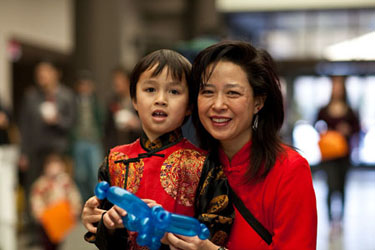Discovering the meaning in Chinese New Year's celebrations

Frances with son at the 2009 Ann Arbor Chinese Center of Michigan Chinese New Year's Celebration, our new family tradition | Photo courtesy of Andrew Fang photasa.com
My brother and I forced our parents to celebrate Chinese New Year that year. We invited all our relatives over for a big dinner of Mongolian hot pot and we made a special trip to the really far Chinese butcher’s for the extra-thin cuts of meat needed. Aunts No. 3 and 6 came with all our cousins, and we had so much fun with the house full of relatives, warm with gossip and food, that we did not even notice until everyone had left that we still did not get any red envelopes.
Every year after that, I would ask my parents what they were planning for Chinese New Year, and the usual response was, "Oh, I don’t even know when it is. I’ll have to check the Chinese calendar." If I was home, and insistent, then they would cook a meal and invite some relatives over; if not, then they would forget. They were modern Chinese who did not need these old world superstitions. But I did.
I did not really know much about Chinese New Year traditions, just bits and pieces - a big dinner, red clothes, clean the house, a whole fish, but don’t finish eating the fish (although everyone always does). I did not understand why you did these things — something to do with luck and good fortune in the coming year, but everything Chinese has something to do with luck and good fortune.
Then I grew up and my children started going to Chinese School, and together we were entranced by the stories we heard — about scaring away the monster, Nian, with firecrackers and red clothes; about how the 12 animals of the zodiac were chosen; about la-pa zhou. The children made toy fire crackers with toilet paper rolls, cut out the character for spring and pasted it upside down on a red square, and dressed up as red fire crackers for the Chinese School pageant. It was the first time I had heard these stories and done these activities as well. The details were beginning to be filled in. We read and we studied and we listened and we cooked until we had a comprehensive, rather than accidental, understanding of Chinese New Year and what it all meant. I could finally see how the pieces fit together.
That was when I stopped pining for what I never had. Even though a lot was learned from books, the traditions came alive for us when we did them. We had one formal and ultra-traditional Chinese New Year when my oldest two children were 4 and 2. Once that was over with, we could relax, adapt, and create something new and meaningful that fit our family each year. Sometimes we were too busy to make dumplings or to have people over for dinner; sometimes we celebrated on a different day, and we certainly have never managed to clean the house on time. Chinese New Year has become our anchor that holds us poised between our family’s past and who we want to be in our community’s future.
Chinese New Year’s Day will be on Feb. 14 this year.
Frances Kai-Hwa Wang is a second-generation Chinese American from California who now divides her time between Ann Arbor and the Big Island of Hawaii. She is editor of IMDiversity.com Asian American Village, lead multicultural contributor for AnnArbor.com, and a contributor for New America Media's Ethnoblog. She is a popular speaker on Asian Pacific American and multicultural issues. Check out her website at franceskaihwawang.com, her blog at franceskaihwawang.blogspot.com, and she can be reached at fkwang888@gmail.com.
This article is adapted from an earlier and longer article that originally appeared in IMDiversity.com Asian American Village.


Comments
Frances Kai-Hwa Wang
Wed, Feb 24, 2010 : 7:58 p.m.
Photos are at http://www.annarbor.com/passions-pursuits/celebrating-the-chinese-new-year/ One fun event here: http://www.annarbor.com/passions-pursuits/huaren-mosaic-culture-show-saturday-at-power-center/ and another here: http://www.annarbor.com/passions-pursuits/ann-arbor-chinese-center-of-michigan-chinese-new-years-celebration/
Ann Arbor mom
Mon, Feb 15, 2010 : 10:32 a.m.
Love your articles! Could you suggest some Ann Arbor area Chinese New Year activities and events?
Wolverine3660
Sun, Feb 14, 2010 : 5:47 p.m.
Frances- My request is that you post more pictures of the events you cover. Will add to the quality of your articles.